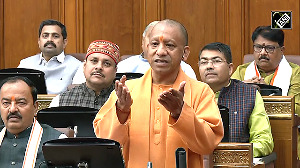Where do Vijay and his TVK expect to get their votes from?
Vijay has a huge fan following among women, but will they automatically become his voters like they had done for MGR's AIADMK, asks N Sathiya Moorthy.

It takes a lot of courage, especially for a very successful film personality, to give it all up and jump into the unpredictable pool of politics and elections.
Tamil cinema's superstar Rajinikanth tried and failed but the late Vijaykanth succeeded with some effort but only to a limited extent.
Rajinikanth's successor to the title, Vijay, has done it -- or, has promised to do it. With the box office tingling in his favour for films and years now, the 50-year-old actor began by declaring the name of his political party as Tamizhaga Vetri Kazhagam (TVK), that too after registering the same with the Election Commission.
In comparison, until the very end, Rajinikanth did not make any such move -- and allowed scepticism to take over his fans for years and decades.
In the end, he proved his critics right, by crying out ahead of the 2021 assembly elections in Tamil Nadu, citing health issues in the midst of Covid recovery for the self and the world as a whole.
Interestingly, post-withdrawal, his films like Jailer (2023) did better at the box-office than a few that bombed in a row.
Did it owe to the fact that politically-aware fans had begun boycotting him after his unconvincing moves on the electoral front ahead of the 2021 polls -- but returned to him once they were convinced that he won't be a threat to the political parties to which they otherwise owe their allegiance?

What makes Vijay's political entry unique from among the long list of actor-politicians in the Tamil pantheon is his early declaration that ahead of contesting the 2026 assembly elections on the TVK brand, he would have ended his very successful film career for good.
It takes a lot of guts for an actor with a lot more of cinema in him to take that decision and declare it in the open, for his fans and other voters to assess in good time.
In comparison in recent times, Rajinikanth, now 73, could not take that decision. Compatriot-actor Kamalahaasan continues to travel on two boats since the launch of his Makkal Needhi Maiyam.
Even as his politics failed, though not as miserably as in the case of the late thespian Sivaji Ganesan in his time, Kamal had his commercially most successful film, Vikram (2022) only during his continuing duality.
However, his more political Indian 2 (2024) bombed recently, taking down the reputation of S Shankar, one of the nation's most successful film-makers, with it.
There are lessons for Vijay to learn from the political footsteps of the likes of Kamal, Vijayakanth and Sivaji Ganesan, after he had put into practice what he had learnt from Rajini's experience -- not to mislead or take the fans for granted, for too long.
Like Vijay now, Vijayakanth was one actor who launched a party and entered politics -- but in his case, his politically powerful films had begun tiring his fans and other viewers alike, as all of them came out of the same one-liner: Good man versus bad man, good cop versus bad man.
Another actor-politician from Vijayakanth's generation, Sarath Kumar, merged his party the All-India Samathuva Makkal Katchi with the BJP ahead of the Lok Sabha polls this year.
His explanation that the idea woke him up from sleep at 2 am and he then shared the decision with actor-wife Radhika Sarathkumar, only became the butt of many memes.
Radhika contested the Virudunagar Lok Sabha seat as a BJP candidate, and came a distant third against Congress victor, Manickam Tagore, who retained the seat, despite a configuration of her Naidu community votes and Sarath's Nadar votes.
Vijayakanth's son, Vijaya Prabhakaran, also a Naidu by community identity, came second, in the AIADMK-led alliance.

The greatest of actor-politicians in Dravidian Tamil Nadu was the legendary M G Ramachandran, MGR for short, who is still possibly the most charismatic actor-politician in the country.
He travelled in the two boats simultaneously, and used one to promote the self in the other, and vice versa.
It suited the times in which he lived, as in the post-Independence decades, cinema medium was used, and was expected to be used, to promote social awareness and prick social conscience -- a euphemism for soft-politicisation.
MGR was followed by Jayalalithaa, fellow-actor, his political find and successor, but there was a difference.
MGR built the AIADMK out of the parent DMK, facing off and fending off many challenges thrown by the wily M Karunanidhi, who was also the unsparing and unforgiving chief minister at the time.
Jayalalithaa too had to fight her survival battles after MGR's death, when the old cabal tried to elbow her out but failed.
She also fought an older and wiser Karunanidhi, survived and won many a battle against the DMK under his care.

Today, Vijay has all these patterns to choose from, rather learn from.
Like MGR, Rajinikanth and Vijayakanth, but more subtler than them all and in that order, he pepped up and peppered his recent films with a socio-political message, which was larger-than-life from a simple and simpleton voter's perspective.
Thus, Vijay's Sarkar (2018) spoke about electoral reforms in a unique form, but his super-stardom required a larger canvas than normal that his film-maker A R Murugadoss packaged it with.
There was one on medical college admissions scam in Bairava (2017). His BJP adversaries, starting with Tamil Nadu party President K Annamalai, were aghast when Vijay, after registering his new party and at the conclusion of the Lok Sabha polls that he had consciously stayed away from, criticised NEET for medical admissions.
Annamalai said that Vijay's opposition to NEET showed him up as anti-BJP, and hence he has left the anti-Dravidian 'Opposition' space open for the ruling party at the Centre.
It is easier said than done, not that it is easy for Vijay and the TVK, either, to do so.
Vijay's fans did not expect the BJP to react the way Annamalai did. For long, pro-BJP social media activists especially had run him down by name and religion, often referring to his parents converting from Hinduism to Christianity, with a young Vijay taking the official name, Vijay Joseph.
These critics saw more than the rest in every word that Vijay spoke on the silver screen, every innocuous action of his, to attribute religious motives that were not visible to others.
So much so, and possibly so, Vijay came attired in a saffron veshti/lungi in the older of the father-son dual roles he played in Bigil, which was a sports story, made different by the younger Vijay, football coach, inspiring and instilling self-confidence in Tamil Nadu's women's team till the very last -- and cinematically so -- for them to win the national championship.
Better still, father Vijay also sported sacred ash on his forehead in almost every scene, and was surrounded by aides, one wearing what is branded as 'Dalit' blue and another, a Muslim by name, with a skull-cap of the Islamic faith.
It is highly doubtful if the message went across. At least in the case of Rajinikanth, such gimmicks did not give him the kind of confidence to enter direct politics after playing with such symbolisms in films like Kabali (2016) and Kaala (2018).
As far back as 1995, when Rajinikanth had begun testing the electoral waters through socio-political themes in his films, he chose a unique name, 'Manik Basha' for his don role, that too after his Muslim friend, slain by the villain.
The film Baashha (1995) is one of the most successful and evergreen movies of the super-star.

Vijay began by declaring that in the coming months, he would complete two films and that was the end of it.
His father-son dual-role offering GOAT, acronym for the longer and non-filmi title, Greatest of All Time by maverick film-maker Venkat Prabhu, the writer-director of such sleek and brainy thrillers like Mankatha (2011) and Maanadu (2021), a sci-fi involving a time-machine, is due for a theatrical release on September 5, incidentally the birthday of former President and educationist Dr Sarvapelli Radhakrishnan, and which is celebrated across the nation as Teachers Day.
Some time back, Vijay had announced that he would do one more movie before the 2026 elections, possibly releasing it before 2025 was out.
However, media reports have it that no producer is reported willing to cough out a very high Rs 250 crores, supposedly up from Rs 200 crores Vijay was paid for GOAT.
Maybe, they are all waiting for the box-office report of GOAT before putting their money where their brain now is.

It is anybody's guess if such reports of Vijay demanding and getting such high sums for his films will go down well with ordinary voters, who would see it in the traditional rich-poor context. But by election time, it would all be a thing of the past. Or, that is the hope.
Of course, his fans are arguing on social media, that their super-star was doing it all only to spend it in the elections and on the people -- just as MGR's fans believed in his time and he too acted the role of a philanthropist in real life, too.
They refer to the way Vijay has organised felicitation functions for Class 10 and 12 toppers from all districts across the state this year and the last, and also to his speeches on the occasion.
This year, for instance, he asked those toppers to aspire to be leaders in their chosen field, and not to shy away from politics, which could do with more of educated and knowledgeable leaders.
However, Vijay's concerns, expressed at the felicitation function(s), over drug-menace threatening the future of the state's youth has become subject matter of multiple interpretations.
While straight forward, critics of the DMK state government claimed that it was a hard-hitting attack on Chief Minister M K Stalin, others beg to differ.
According to them, Vijay had actually told the students that it was not only the responsibility of the state government to wipe of drug menace.
Instead, every student and parent also had a responsibility in the matter. However, such cause for multiple interpretations can only confuse the present-day voters, who do not have the time, inclination and energy of counterparts from the MGR days, who would muse and debate over what the leader had said, or was trying to convey, by saying too much, too long, that in a convoluted form.

All of it leads to the more direct and imminent question: Where do politician Vijay and his TVK expect to get their votes from? After MGR, Vijay has a huge fan following among women, but will they automatically become his voters like they had done for MGR's AIADMK?
At least, it needs to be tested in 2026, but the fair expectation is for TVK strategists to work on socio-economic themes that would retain them, after they had seemingly migrated from the AIADMK to the ruling DMK, in the light of Stalin's 'women empowerment schemes' of the past three years.
The list includes Rs 1,000 a month for woman-headed families, and now college students, both girls and boys, free bus travel, and free breakfast scheme on the lines the nutritious noon meal scheme, introduced by the MGR government in the early eighties but promoted also by rival DMK with add-ons whenever in power.
It remains to be seen what more can the DMK state government offer its constituents in the two years before the assembly elections, due in the summer of 2026 -- and what existing political rivals like the AIADMK and the BJP are to make of them.
In context and contrast, the voter will be waiting to see what Vijay's maiden election manifesto too would have to offer -- more, or less, and if so, where, what and how.

Beginning the first general elections in 1952, present-day Tamil Nadu, then forming part of the composite Madras state, including the pre-Independence British era parts of unified Andhra Pradesh, Kerala and Karnataka, had sort of allocated 10-per cent vote-share for new and upcoming political parties, as different from 'swing votes' that are undecided initially.
Over time, the residual Communist votes in the new Madras state, now Tamil Nadu, went to the pre-split DMK, almost immediately.
In the linguistic Andhra Pradesh, these leftist votes ended up in the Telugu Desam Party, when actor-politician N T Rama Rao floated the new outfit in the early 1980s on the premise of 'Telugu atma gouravam' or self-respect.
In 1952, thus, these segments, incidentally forming a caste grouping from the northern belt of present day Tamil Nadu, voted for the two Vanniar-strong sub-regional electoral outfits, namely, the Commonweal Party and the Tamil Nadu Toilers' Party.
The DMK, founded in 1949, too, had fielded Independents in some constituencies. Together, these votes formed the core of the 12 plus per cent vote share that the DMK got in its first official electoral outing in the linguistically divided Madras state, in elections 1957.
Incidentally, the Linguistic Reorganisation of States in 1956, following which the Malayalam-speaking areas of composite Madras state went to Kerala, also caused the first democratically elected Communist government in the world -- in that state.
Throughout the subsequent decades, this 10 to 12 per cent vote share for a new political party travelled from one to the other until in the 1990s, when the MDMK that had broken away from the DMK and the Vanniar-strong PMK divided those vote shares between them after they had rested in the DMK for long.
This also indicated a visible fall in the DMK's vote share for some time until they returned to the parent fold, but then the 'experimental vote share' had migrated to the late G K Moopanar's Tamil Maanila Congress-led alliance in the disastrous parliamentary polls of 1999, forcing him to join hands with the rival AIADMK for the successful assembly elections of 2001, that too in the company of his Congress parent.
The new century saw the emergence of actor-politician Vijayakanth's DMDK in 2006 assembly polls, which increased its vote share from six per cent to 10 plus per cent in the 2009 Lok Sabha polls even without a prime minister candidate to call its own. But the two elections also exposed the traditional limitations of 'new electoral outfits', as there was no hope or scope of expanding the poll-base beyond this point.
This in turn forced Vijayakanth to join hands with the AIADMK, to sweep the 2011 assembly polls against the ruling DMK -- but that was the last of it for the DMDK to call a bright poll but with a diminishing future.
Later on that votes went partly to Kamal Hassan's MNM but mostly to yet another actor-politician, Seeman's Naam Tamizhar Katchi.
Over the past years and elections, Seeman has been working to re-brand his party from a pan-Tamil, pan-Dravidian outfit to a broader political experiment with place for every religious faith and caste combinations.
Even his pan-Tamil vitriolic has lost some of its original sheen, which seems to be a deliberate attempt at broad-basing his vote-share.

Now the initial question is if Vijay can create a new vote bank of his own, like MGR and Vijayakanth did, mostly with his fans, or will he be taking away or at least eating into the 'new party votes' that have just now settled in Seeman's NTK.
The latter's current vote share stands at 8.16 per cent as against 1.76 per cent in the 2016 assembly polls.
Maybe, anticipating such a possibility, Seeman has begun talking about working with Vijay in 2026 but the latter has not responded as yet.
In fact, Vijay or his party has not reacted to any of the socio-political developments, both at the state level and the national level, barring those two stray comments on NEET and drug abuse.
Seeman has never talked about wanting to become chief minister, hence would not have problem accepting a more popular actor-politician Vijay as his alliance leader.
The fact that Annamalai lost no time in joining issue with Vijay on NEET indicated that under his leadership the state BJP would not want to palm off the chief ministerial candidacy to the TVK boss -- hence limited possibilities of a poll alliance for 2026.
It is also a fact that only in the past year, pro-BJP social media activists have stopped wanting to link Vijay and Seeman as 'Christian stooges' of the West.
It can also work against the latter two coming together, if only to avoid reviving the Hindutva talk of a 'great conspiracy' against the nation and the state.
At the same time, the AIADMK, still continuing to lick its wounds from the Lok Sabha polls, may be looking at the NTK option.
Party boss and former chief minister Edappadi K Palaniswami especially cannot be seen as palming off the top job to Vijay -- nor can he see himself doing it. That leaves the field wide open.
Some clarity will begin emerging only after Vijay launches his party at a formal rally in the coming weeks, and follows it up with regional and district-level conferences.
This is what political muscle-flexing is all about, that too for a new party, in the long run-up to elections which it has been eyeing for long.
N Sathiya Moorthy, veteran journalist and author, is a Chennai-based policy analyst and political commentator.
Feature Presentation: Rajesh Alva/Rediff.com











 © 2025
© 2025